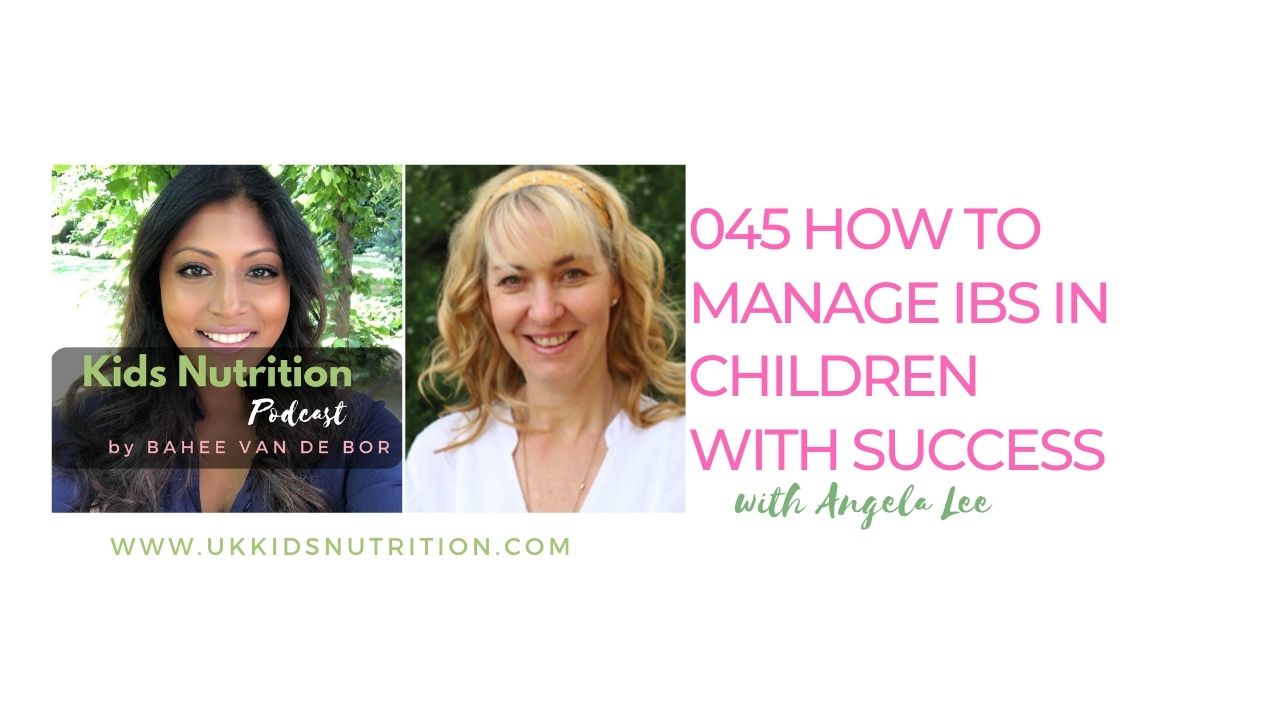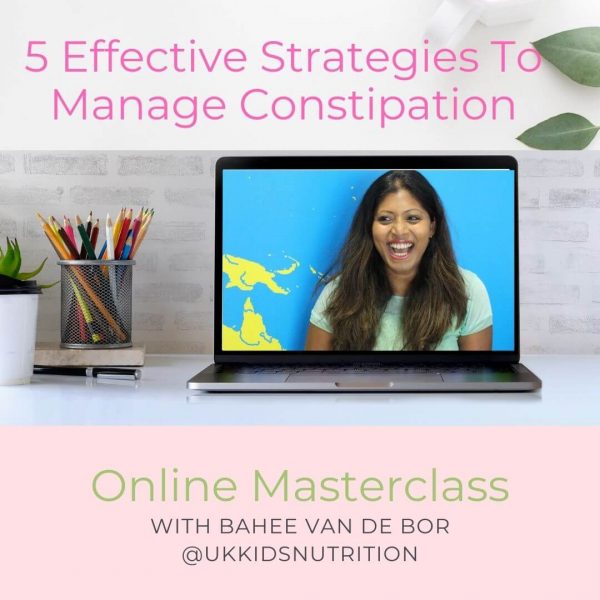Subscribe: Apple Podcast | Email | Spotify | Stitcher
Want to learn how to manage IBS (irritable bowel syndrome) in children with success?
My guest on today’s Kids Nutrition Podcast is Angela Lee who lives in Australia.
Angela is a fully qualified and registered dietitian who works with both children and adults dealing with IBS. Using the principles of the FODMAPs diet, she helps families manage IBS symptoms of constipation, diarrhoea or both with success.
In this episode, Angela takes us through how children are first referred to her service. She shares the steps she takes before starting the FODMAPs diet and the entire process that’s required to successfully manage children with IBS symptoms.
If you are worried that your child may be suffering from IBS then this podcast episode is a must for you.
Before we dive straight into this interview, I wanted to let you know about two Facebook groups.
I have a free Facebook Group that you can join called IBS kids.
So if you just type IBS kids into Facebook, it will also come up.
Angela also has a new Facebook Group called ‘Low FODMAP Kitchen for Kids’.
How did you start working in helping children with IBS?
So I first learned about the Monash low FODMAPs diet when my son was diagnosed with fructose intolerance. I then became interested in that area. And now I find myself just working in private practice specialising with children and adults with IBS requiring a FODMAPs diet trial.
What is the FODMAPs diet?
FODMAPs stands for fermentable oligo, disaccharides, monosaccharides and polyols. And they’re found naturally in fruits and vegetables, grains, dairy and legumes. But unfortunately, they’re absorbed poorly by some people.
Is it true that we don’t naturally absorb FODMAPs sugars, anyway?
Yes, especially children under the age of 10 years can have reduced absorption of fructose.
But generally, adults and children can find it difficult to absorb the five FODMAPs sugars, especially galactooligosaccharides (GOS) which is one of the FODMAPs sugar.
What’s irritable bowel syndrome (IBS)?
IBS stands for irritable bowel syndrome. Some people may have really common symptoms such as excessive wind.
They can also have some bloating, altered bowel motions, such as constipation or diarrhoea or a combination of both.
It’s a little like if you had a balloon in your bowel and you blew the balloon up and kept blowing it out! That’s kind of what it feels like for somebody who has bloating with IBS.
What are IBS symptoms and how do you diagnose them?
For diagnosis, it’s best that children are seen by a GP or paediatrician first.
A medical diagnosis is essential to identify other causes apart from FODMAPs that are driving diarrhoea or constipation. Other chronic conditions can be ruled out with all the necessary investigations.
Issues like Coeliac disease can also present with similar symptoms to IBS. So it’s important to get an accurate diagnosis. If you suspect that your child may have IBS due to diarrhoea, it’s important to have this formally reviewed by your child’s GP or gastroenterologist.
Do you work on a referral basis?
We do get referrals from GPs, but we also have referrals from other sources. And some of those referrals come through our Facebook groups as well.
When parents ask questions about that group, they get initial advice. When they realise that they can’t manage the diet on their own, they request 1-2-1 help.
How do you decide when is the right time to try a FODMAPs trial?
You can consider a trial for children when they’ve got symptoms that start to interfere with what they need to do every day or on a daily basis.
So if it stops your child from going to school or playing sports and socialising, then it’s time to look at a FODMAPs diet and trial that.
Sometimes it could be that it doesn’t necessarily severely affect their day-to-day life, but children experience pain and discomfort. In this scenario, it could be worthwhile exploring to see if the FODMAPs diet can help reduce IBS symptoms.

CLICK TO WATCH THE MASTERCLASS
How do you manage children who are fussy eaters and have IBS?
You really need to consider the pros and cons when you have fussy eaters. They may obviously have a limited variety of foods already.
And when we’re using a restrictive diet, such as the low FODMAPs diet, we can end up taking too many things out of their diet.
So that’s why it’s essential to work with a paediatric dietitian because they can ensure that your child’s growth isn’t going to be affected.
A paediatric dietitian can make sure that your child will have foods from all the food groups, and make sure that they still meet their requirements.
Can IBS be an underlying reason for fussy eating?
For children who are also fussy eaters, you need to really consider how to use the low FODMAPs elimination diet.
You can start with the more simplified approach which can help with fussy eaters as you don’t need to take out too many food groups or foods from their diet that they enjoy.
And make sure that you substitute with nutritional equivalents so that children’s growth is not affected.
And this is why working with dietitians can be particularly helpful as he/she will make sure that your child still eats a balanced diet.
IBS and FODMAPs diet is starting to become very trendy. Although it’s tempting and parents might think, why don’t I find out more about the diet and try this diet myself?
Despite the availability of free information online, that information may not necessarily have been written by true experts like dietitians who specialise in FODMAPs.
Angela agrees that a lot of the information online isn’t really accurate or correct.
Which resources do you recommend?
You need to be really cautious about just trusting what you read online. A useful resource that can be used in conjunction with seeing a dietitian to help you navigate the low FODMAPs diet is the MONASH FODMAPs app.
It has regular updates, recipes and items that you can use to help you make your meals at night with your family.
Do parents worry that their children cannot tolerate gluten?
That is an interesting point you raise because it has come up quite a few times in my practice as well. So by removing wheat from the diet, people don’t realise that they are actually removing both the gluten and the fructans.
Fructans are a type of FODMAPs sugar. So then it can be difficult to tell whether it’s the removal of the gluten or the removal of fructans that’s made a difference.
And it’s not just wheat that contains fructans. Other vegetables also contain FRUCTANS so it’s important to work with a dietitian to make sure that you identify the correct trigger foods.
It’s also important to work with a paediatric dietitian so that the right foods are being challenged in the right quantities. And then introduce the foods back into the diet as well.
How would you describe the FODMAPs diet exclusion phase?
Yes, it’s like a trial but more like a tool that clinicians know how to use.
And the FODMAPs diet is not designed to help you lose weight or to make someone have a ‘healthy gut’.
Unfortunately, some people do remain on this diet for a long time. They don’t go through the other stages.
And they don’t reintroduce the foods back into their diet and certainly, in children, we want to make sure that their diets have lots of variety.
We should reintroduce as much as possible to reduce fussy eating as well.
What can go wrong if parents decide not to reintroduce high FODMAPs foods?
So one of the things that I find is if they’ve already been on the low FODMAPs diet, and if it hasn’t been done precisely, then we’ve got to readjust it and make sure that parents are doing it correctly.
So it’s extended time the child has to remain on the diet. So it means they’re restricted for longer.
And what makes it difficult once we’ve gone through the process is that we have to try and get variety back into the diet, which can be difficult.
And then obviously, there are nutrients of concern in the low FODMAPs diet.
Nutrients like calcium, iron, and fibre which we are generally not getting enough of.
For children, in particular, the mineral calcium is really important for bone health, normal development and growth.
And so if parents are trying to do this alone, and they don’t know how to substitute dairy, then that can be an issue and children may not be receiving enough calcium at a crucial time of their growth and development.
What could go wrong if parents start the FODMAPs diet without dietetic supervision?
Well, sometimes it’s not a matter of even using a low FODMAPs diet.
Sometimes, parents can come in and say, you know, I need to go on a low FODMAPs diet for my child. My child has got gut issues. And then when I go through my assessment, I realise that their child’s problems may not be resolved using the low FODMAPs diet.
And perhaps it’s just a matter of substituting processed foods, and some snacks, and increasing their fluid and their fibre intake.
And then swapping certain foods and increasing more vegetables and fruit in their diet. So sometimes it’s just a matter of looking at what they’re currently eating even before trying the FODMAPs diet.
And only then if that doesn’t work, consider the low FODMAPs diet.
How long does the low FODMAPs diet trial take?
The whole process can take up to 12 weeks. And during that time, we will look at challenging the FODMAPs sugars, and then we’ll be also reintroducing the eliminated foods, including the ones that are tolerated back into their diet.
So it is also a ‘low FODMAPs diet’, not a no FODMAPs diet.
And so we need to adjust based on children’s tolerance levels. What they can and cannot have at that time.
And obviously, we know with children that their guts are developing so in the future, it’s always best to have a follow-up future appointment.
This can help reassess, any changes due to that growth and development, especially around fructose.
Once a child has completed the 12-week follow-up trial, when should they reassess tolerance?
So it would be good to see children again in 12 months’ time.
And then depending on their age, so if they’re close to 10 years of age, reassess to check for further tolerance.
This is because the research at this stage shows that children under the age of 10 years, already have a reduced capacity to absorb fructose.
Their absorption improves with age.
What’s the best part of the FODMAPs diet?
It’s just really satisfying for the parent and the child because the parent feels really empowered because they feel like “I’ve helped resolve the problem.”
The child is also happy because they are feeling more comfortable about the foods they can eat.
And they’re able to eat some of the foods that they were unable to eat before or they can eat it in a quantity that’s not going to give them the symptoms of diarrhoea or constipation.
When reintroducing in a systematic way, you can identify which foods your child can tolerate.
I think also children get the hang of it really easily. More quickly than what adults do. And so they are able to navigate, and they know how much they can have.
They know if they’re going to have an apple, how much they can have. Or if they’re going to have a peach, which is high in FODMAPs, they know “I can only have half a peach, and then I’m not going to have any symptoms.”
“But if I have two peaches, I might have some problems.”
So it’s really good because it empowers the children as well.
The bottom line from Angela Lee
- I suppose one of the main takeaway points is that it’s really good to work with a dietitian because they can help and give ideas to the families about what meals they can make for their families.
- And they can also help reduce the cost because they know which substitutions to use and they can recommend products.
- And it means you don’t have to go and buy a store brought sauce or they can tell you how to pair foods. So it’s useful that they can give you all that extra information that you won’t necessarily find by yourself.
Additional Posts
How To Restore Your Child’s Gut Using FODMAPs Diet
Read More >>
About your podcast host
Bahee Van de Bor is a registered paediatric dietitian with 16 years of clinical experience. If you need advice and support for suspected IBS from a children’s dietitian who has over 15 years of working with children, then learn more about the IBS Kids Programme here.


